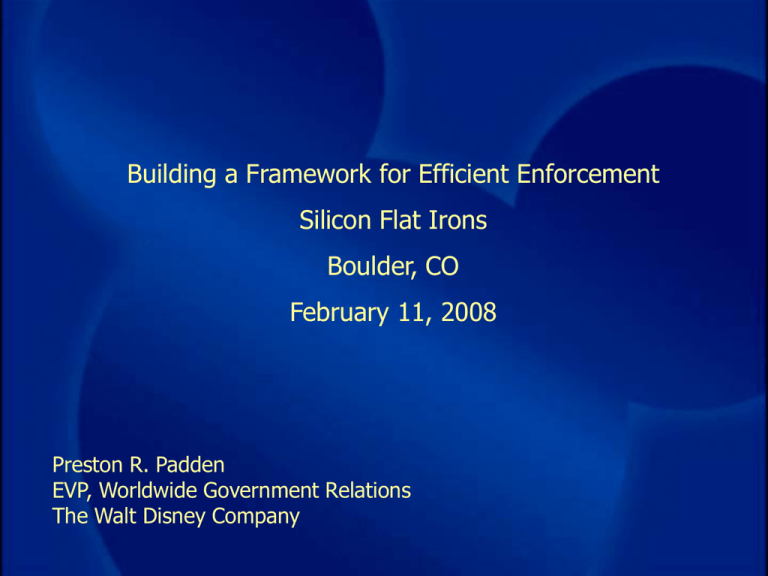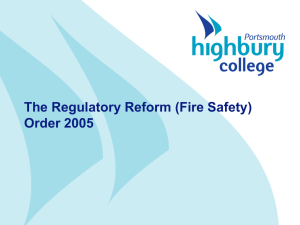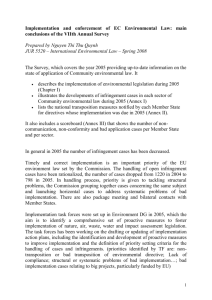Preston Padden
advertisement

Building a Framework for Efficient Enforcement Silicon Flat Irons Boulder, CO February 11, 2008 Preston R. Padden EVP, Worldwide Government Relations The Walt Disney Company Efficient Infringement Enforcement First, An Update “The best way to combat piracy is to bring content to market on a well-timed, well-priced basis.” - Bob Iger, CES Keynote Address, Jan. 8, 2006 “Of course, the best deterrents to widespread infringement are business models for online content delivery that are reasonably priced, easy to use and flexible.” - Gigi Sohn, Before the Sen. Judiciary Committee, June 21, 2006 Some Early Returns • Over 240 million episodes initiated since the launch of the abc.com player in Sept. 2006. • Early surveys showed 65 percent of ads completed per program. • 87 percent sponsor recall (vs. 30 percent on network TV). • 79 percent rated abc.com a superb viewing experience, with 87 percent responding that they were likely to recommend. • More than half rated it a great advertising experience. • These figures in addition to the 34 million TV episodes sold from the Disney-ABC Television Group on iTunes since the launch of video sales in Oct. 2005 (figure does not include ESPN sales). Toward a Framework for Efficient Enforcement 24 years ago the Supreme Court noted the important role of intermediaries in ensuring meaningful enforcement of the copyright law, making clear that legal doctrines of secondary liability -“must strike a balance between a copyright holder’s legitimate demand for effective—not merely symbolic—protection of the statutory monopoly, and the rights of others freely to engage in substantially unrelated areas of commerce.” -- Sony Corp. of America v. Universal City Studios, 464 U.S. 417 (1984) 21 years later, the Supreme Court recognized the ongoing importance of this balance to enforcement in a distributed, online environment: “When a widely shared service or product is used to commit infringement, it may be impossible to enforce the rights in the protected work effectively against all direct infringers, the only practical alternative being to go against the distributor of the copying device for secondary liability on a theory of contributory or vicarious infringement.” -- Metro-Goldwyn-Mayer Studios v. Grokster, 545 U.S. 913, (2005) Toward a Framework for Efficient Enforcement In dealing specifically with the role of Internet intermediaries, Congress rejected calls for common carrier immunity in favor of a policy of shared responsibility through a “safe harbor” approach that -“preserves strong incentives for service providers and copyright owners to cooperate to detect and deal with copyright infringements that take place in the digital networked environment.” -- Report of the Senate Judiciary Committee on S. 2037, the Digital Millennium Copyright Act. Putting Legal Obligations Aside … • Too often we get lost in a debate over what the law requires of the various parties • In the last year there have been a number of examples of the good things that can happen when we all put that debate to one side and focus instead on what is the right thing to do in order to ensure “effective—not merely symbolic—protection” of copyright. • This has been possible in large part because of the increasing alignment of the interests of consumers, copyright owners, and service providers. Some examples … University Antipiracy Cooperation A number of universities have begun to engage affirmatively to address piracy on campus networks, through technology solutions, education, adoption and enforcement of real network abuse policies, and the offering of legal services as an alternative to theft. Here are a few examples … • University of Florida developed its ICARUS network management tool in 2003 after finding that “file sharing was severely undermining the integrity of DHNet (the University housing network) and causing massive slowdowns in useable bandwidth.” As a result, U of FL: - Saw an 85 percent reduction in outbound traffic and a 40 percent reduction in inbound traffic; - Received a taxpayer award for having saved $500k by being able to delay infrastructure improvements, and an additional $2 million in cost savings when improvement were made simply because the price of equipment had declined in the interim; and - Reduced its DMCA notices to zero. • Florida has since started making its network management tool available to other institutions under the Red Lambda name. University Antipiracy Cooperation • University of Utah began using Audible Magic’s filtering software in 2005, in conjunction with a network monitoring strategy aimed at bandwidth hogs. Since doing so: - The number of DMCA notices received has declined by more than 90 percent; and - Rather than having to hire an additional full-time employee to respond to infringement notices it is able to dedicate only 3 person-hours per week dealing with network abuse issues. • Arizona State began using Audible Magic’s technology after being identified as one of the 25 universities receiving the greatest number of notices from the RIAA. ASU reported about 5 percent of the university’s overall traffic was blocked as infringing, without any noticeable increase in calls to their help-desk or a single complaint about interference with legitimate network uses. • Audible Magic testified before Congress that after installing its technology, one of its clients saw an 80 percent decrease in total network traffic in one month, a 71 percent decrease in the number of users of p2p applications, and p2p traffic dropping from 20 GB per day to basically zero in less than one week. ISP Antipiracy Cooperation • AT&T Filtering “We are very interested in a technology based solution and we think a network-based solution is the optimal way to approach this. … We recognize we are not there yet but there are a lot of promising technologies. But we are having an open discussion with a number of content companies, including NBC Universal, to try to explore various technologies that are out there.” -- James Cicconi, senior vice president, external & legal affairs “It's like being in a store and watching someone steal a DVD. Do you act?” -- Randall Stephenson, Chief Executive Officer “Verizon and Disney also agreed to cooperate, consistent with the U.S. Digital Millennium Copyright Act, to help curb infringement of Disney's copyrighted works over the Internet while at the same time appropriately safeguarding the privacy of Verizon Internet service subscribers.” “Under the agreement, Verizon would forward and track notices to its subscribers allegedly engaged in the unauthorized distribution of Disney’s copyrighted works, without identifying the subscribers to Disney, and either provide subscriber identifying information pursuant to lawfully served subpoenas or terminate Verizon Internet service provided to subscribers who have infringed Disney copyrights and received multiple notices.” A Brief European Tour of ISP and Content Provider Antipiracy Cooperation • 2004 First French Sector negotiations on a graduated response fail • 2005 EU Commissioner Reding, Cannes 2005 : ISPs and content providers need to cooperate • 2006 UK Gowers Report: ISPs and content providers need to cooperate … or legislation – End of 2007 Lord Triesman sets deadline by summer 2008, negotiations ongoing • 2007 Belgium: Collecting Society SABAM obtains injunctive relief for filtering of infringing content against ISP Scarlet • 2007 Sweden, Renfors Report: ISPs need to cooperate on antipiracy efforts • 2007 France Olivennes agreement: President Sarkozy endorses sectoral agreement to bring content online, raise consumer awareness and facilitate ISP – content provider cooperation Continued … A Brief European Tour of ISP and Content Provider Antipiracy Cooperation • 2007 Germany RapidShare – German collecting Society GEMA gets injunctive relief against RapidShare with filtering obligations • 2007 Telecoms Package – European Commission suggests cooperation also as a matter of communications infrastructure legislation • 2008 - Telefonica Decision: While there is no EU obligation for ISPs to share data in civil enforcement cases, national legislators, authorities and courts have to balance the fundamental rights of both privacy and intellectual property while also considering proportionality and access to justice. • 2008 Sweden: The Pirate Bay faces the prosecutor • 2008 Denmark: Based on previous case law, ISP Tele2 ordered by court to prevent subscribers from accessing The Pirate Bay Summing Up … Much remains to be done. But these developments signal a way forward in the longstanding effort to ensure the law provides for both effective (and efficient) protection of copyright and the rights of others freely to engage in areas of commerce substantially unrelated to piracy. - The End -




